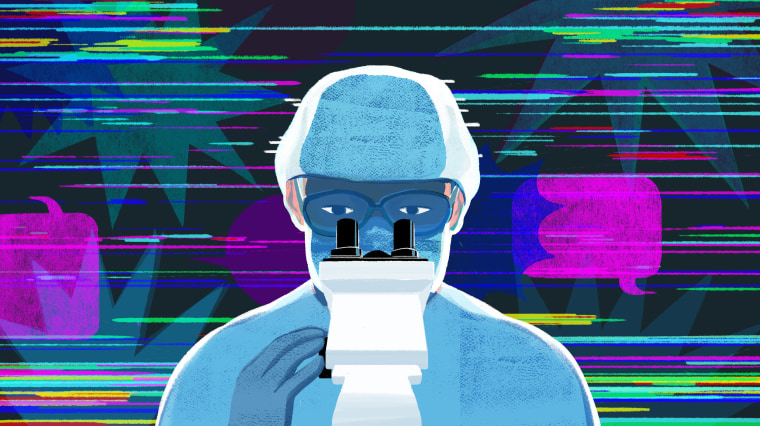As an emergency doctor, I'm noticing a troubling trend among some of my patients when it comes to scientific recommendations around COVID-19. Despite rising deaths around the country and spikes across the South and the West, Americans are not all on the same page. Because the health community's conclusions and findings are adapting as we learn more about the virus, some Americans believe they shouldn't trust the science, on the grounds that "it was wrong before" or that "the advice keeps changing."
It's important that doctors and officials acknowledge their mistakes. But it's also a teachable moment.
Obviously, the U.S. response to the coronavirus hasn't been perfect. And it's important that doctors and officials acknowledge their mistakes. But it's also a teachable moment. Doctors aren't infallible, but our commitment and ability to constantly learn and update our findings are precisely why science is so valuable.
Scientific data doesn't come to us in a tight package. It's messy. It can even be contradictory. This is all part of the process of arriving at the best information for public health. The difference with the coronavirus outbreak, however, is that the process usually plays out over years and behind the scenes. This time, it's playing out on TV and social media, over days and weeks.
Want more articles like this? Follow THINK on Instagram to get updates on the week's most important cultural analysis
As a doctor for over two decades, I have seen the practice of medicine change in many ways. As physicians and scientists learn new information, medical workers try to do better for our patients. For instance, the evidence-based treatment of heart attacks and strokes has evolved to save increasingly more lives and reduce suffering.
But no matter how they happen, scientific discoveries, built painstakingly on foundations of data and proof, are never easy or straightforward. The evolving message on masks is particularly instructive.
In late January, Dr. Nancy Messonnier of the Centers for Disease Control and Prevention said: "We do not currently recommend the use of face masks for the general American public. This virus is not spreading in your communities." She said this a day after the first U.S. human-to-human COVID-19 transmission was confirmed.
Then, a month later, some health experts said telling people to wear masks would encourage a false sense of security and discourage social distancing. In March, the World Health Organization said only people with COVID-19 or who were caring for patients needed to wear masks.
Since then, we have accumulated more data. And now, the scientific research is unequivocal: Mask-wearing reduces person-to-person transmission and helps bring down community infection rates. In a study of mandatory mask policies in 15 states and Washington, D.C., researchers found that infection rates were lower compared to states that didn't mandate masks, with as many as 450,000 people spared COVID-19 infections. In countries where wearing masks was policy or a cultural norm, deaths were lower compared to countries with neither.
A New England Journal of Medicine study demonstrates how masks stop oral and aerosolized droplets dispersed when people speak normally. One study emphasizes the value of mask-wearing in reducing transmission of COVID-19 to other people, especially from people with no symptoms, who account for as many of half of all people with COVID-19. With the abundance of evidence in favor of masks, the CDC is wholeheartedly urging Americans to wear masks now.
But let's be clear: The CDC's earlier reluctance about masks was understandable. At the time, it had little data about the effectiveness of masks. Public health experts worried that front-line health workers wouldn't have enough surgical and N95 masks, which were already in short supply because the Trump administration was so unprepared for the pandemic.
Now, the scientific consensus tells us that masks can save lives. Together with staying at least 6 feet apart from one another and diligent hand-washing, masks are a cheap, effective way to reduce the spread of COVID-19, especially when in indoor spaces and when social distancing isn't possible.
Many of the actions needed to curb the coronavirus will cost money or require political negotiation. Yet the one thing we can all do easily, with little cost, minimal discomfort and no disruption to our daily lives, is to listen to the science and wear a mask. We now know that those pieces of fabric covering noses and mouths can reduce infections and take us one step closer to allowing workers to return to work and students to school more safely.
Not long ago, a patient walked through our emergency department without a mask. Politely, I asked him to wear one. Unlike businesses that can refuse service, my oath to "do no harm" and the Emergency Medical Treatment and Labor Act meant I couldn't kick him out. I sighed inwardly and suited up with full personal protective gear: N-95, face shield, gown, gloves. With potential for COVID-19 aerosol and airborne spread, I was at risk of exposure to an asymptomatic carrier. And so were my care team and others in the emergency department.
His rationale for not wearing a mask?
"It's all fake news," he said.
Science is real, built on foundations of evidence, testability and repeatability. COVID-19 is real, and so are the over 160,000 deaths this disease has caused in the U.S. in just six months.
Universal mask-wearing is a simple step toward reclaiming the freedom Americans have lost to COVID-19. And it's backed by a vital weapon that doesn't care about politics or spin: science.
Related:
- The critical problem revealed by America's endless hydroxychloroquine obsession
- COVID-19 stimulus standoff is an opportunity to undo Trumpian damage. Here's how.
- COVID-19 mask rules spark new hypocrisy. And women will pay the price.
- Did Trump and Kushner ignore blue state COVID-19 testing as deaths spiked?



